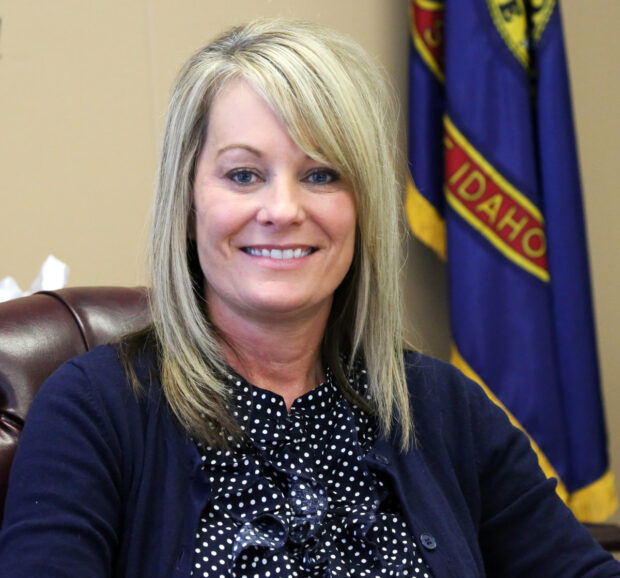
State leaders are bracing for a new round of budget cuts of up to 5 percent in 2020-21, schools chief Sherri Ybarra and other policymakers said Wednesday.
“I know that all of you have a lot of questions about the holdback that is coming and we can’t answer a lot today,” Ybarra said during her weekly webinar. “But what I want to tell you is the discussions are going on and we are working as quickly as we can to put forward a plan.”
Using rough estimates and the $1.9 billion general fund K-12 budget as a baseline, a 5 percent holdback could translate to about $95 million.
“It’s not going to be an easy job or an easy task but we are trying to work as closely with the governor’s office and the people from the field as we can,” Ybarra said.
The new budget year begins on July 1.
Speaking at a Boise Metro Chamber of Commerce legislative review forum Wednesday morning, House Assistant Majority Leader Jason Monks also referenced a potential holdback of up to 5 percent next year.
“That could be pretty big for education,” said Monks, R-Nampa.
But, attempting to soften the blow, Monks said legislators approved a 4.6 percent increase in education funding this year.
“If that happens, we would basically return to 2020 budgetary levels, pretty close to that,” Monks said.
The 5 percent holdback is not official. If the cuts are approved, they would come in addition to the previous budget reset spending reductions and the new 1 percent holdback to the current budget that Little already announced.
School leaders are already scrambling to implement a 1 percent holdback that must be squeezed out during the remaining three months of the budget year. Ybarra and State Department of Education officials told school administrators Wednesday that the holdback will be accomplished by cutting discretionary spending as well as distributions for content and curriculum, professional development training, classroom technology and IT. That 1 percent holdback translates to $18.9 million.
IRI, instructional hours and civics test update
As it turns out, the spring Idaho Reading Indicator and civics test graduation requirements may not be going away. And students will begin taking the IRI at home this week.
In response to school closures and disruptions caused by the coronavirus pandemic, Ybarra and the State Board of Education waived a number of requirements, including the senior project and the college entrance exam.
In areas the State Board felt it lacked authority, it asked Little to waive those for them. Earlier this month, it asked Little to waive the civics requirement, IRI and instructional hours requirements.
“While the Board did vote to ask the governor to waive those, we don’t expect that to happen,” Ybarra said. “The powers that be do not have the authority to do that at this time.”
The instructional hours and civics test requirements are flexible. The State Department of Education will accept waivers to individual districts or charter schools who are unable to meet instructional hour requirements and then bring those waivers to the State Board for approval.
Additionally, local educators and school officials have wide flexibility in signing off on seniors meeting the civics test requirement, including accepting credit for previous courses the student completed. Schools can also identify alternative means for students to meet the requirement, including an end-of-course assessment.
Finally, some students who are already engaged in online learning will begin taking the IRI test as soon as Thursday. However, the results will not be used toward accountability programs, Ybarra and her staff said. Instead, the results will be shared with a child’s teacher to help them understand the progress the student is making now.
“Given remote teaching, we realize not all students can or will be assessed,” director of assessment and accountability Karlynn Laraway said.
State Board of Education update
In response to open meeting concerns, the State Board of Education nullified its action from Monday’s special meeting and conducted a do-over Wednesday.
The issue dates to Monday, when the Facebook live stream intended to broadcast the meeting to the public failed. Due to social distancing requirements and the stay-home order, the meeting was conducted as a virtual meeting and the Facebook stream was the only way for the public to view the meeting live.
When the stream didn’t work, State Board members went ahead and conducted their business.
After discussing the issue with Attorney General Lawrence Wasden’s office, the State Board decided to clear the matter up by redoing each vote from Monday.
“It certainly was not our intent to do anything outside the public view,” State Board President Debbie Critchfield said. “In the future, if the livestream fails, this meeting will be paused until the issue is corrected or rescheduled if that is necessary.”
None of the decisions changed as a result of Wednesday’s do over. But one awkward consequence of redoing the meeting was Ybarra again made an unsuccessful push to block the transfer of 18 fulltime IT and data management positions and $2.7 million away from her State Department of Education to the State Board of Education.
Again, Ybarra’s memorandum of understanding blocking the transfer failed with only her and member Shawn Keough supporting it.
However, Ybarra gave notice that the issue isn’t settled.
“You’re probably already aware the Board of Examiners yesterday approved former attorney general David Leroy as special deputy attorney general to represent the constitutional interests of the superintendent’s office,” Ybarra told the State Board.
Ybarra lawyering up sets up the potential for a legal showdown between herself, the Legislature and the State Board as the planned July 1 transfer looms.
